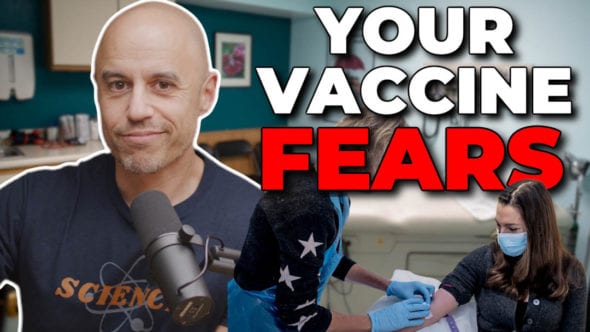A quick and simple overview of how novel coronavirus infection can affect patients.
Check out all our coronavirus pandemic coverage here.
– Okay so, if you’re watching the news and all that, you have still no clue what actually happens when you get Coronavirus, because it’s all interspersed with fear. Here’s what happens if you get infected with Coronavirus, in the instance of the people who aren’t that sick, and the people who get really sick. So the people who aren’t that sick, they may have a fever, they may have a cough, and it’s often a dry cough, although sometimes there can be the productions of snot, and mucus, and that kind of thing. And then some people have a little mild shortness of breath initially, but a lot of people don’t. So it really feels like an early flu, or a cold, you can have muscle aches, that kind of thing. And the majority of people in the series that they’ve looked at get better in one to two weeks. So the symptoms get better, maybe they barely have any symptoms at all. But, you know what, it’s weird, when they actually scan the lungs of these patients that are barely having symptoms, they actually have some abnormalities even then on their lung scans that they’re really not feeling a lot of symptoms of. So, it starts to make you think, people are spreading this thing without a ton of symptoms, and they looked even at the cruise ship, people were testing positive not having a lot of symptoms. So that’s how this thing is probably spreading, we don’t even know it, because we’re not testing everybody around, okay? So mild symptoms, not much going on. Well, what happens in the people who get really sick? And these tend to be older people, they tend to be people with other morbidities, meaning they have a lung disease, or diabetes, or high blood pressure, or heart disease, or they have immunocompromised. And it doesn’t, it’s not always the case, but it seems that the older people are hit very hard by this, and young kids are particularly spared by it. So, in those older patients what may happen is, somewhere after the initial symptoms start, maybe even up to eight days on average after, you suddenly get worse. And the way that manifests is, a lot of shortness of breath. So people really feel like, oh I’m having trouble breathing. And that’s what often leads then to the presentation to the hospital. They end up in the hospital. And at that point it’s a rapid decompensation. Where if you do a scan then, the lungs show these very distinctive patterns of pneumonia. It’s often on both sides of the lungs, it’s often in the periphery of the lungs on the outside part of the lungs, and it often leads to people, up to 15% of the patients, or higher, that show up to the hospital, end up going to the ICU. And at that point, they need help with breathing. Whether it’s a high pressure mask, a lot of oxygen, or an actual breathing tube placed in the lung. Now, why? The reason is, the pneumonia which is a kind of inflammation caused by the infection and the immune response to the infection of the lungs causes a barrier between the ability to exchange oxygen and carbon dioxide, and your blood, and the air. And so as a result, people feel like they can’t breathe, their blood oxygen levels drop, they may have a white blood cell count that’s either too low or too high, and their liver function tests are a little abnormal. Those are some of the lab tests you see. But really, you see they’re just having trouble breathing, right, and oxygenating and exchanging gas. So at that point, you may have to put in a ventilatory assistance tube, an endotracheal tube. Now, what we see then is, in patients who get really sick, they develop something called, and this is why this disease can be so fatal in people who it does affect that way, which by the way, are again, a minority of the patients that are infected. So all the fear mongering and everything you’re hearing on the news, I mean, this can happen with influenza, guys, and it does, it does, all right. So, they get something called acute respiratory distress syndrome. That’s when the lungs really take a hit. They get damaged. And if you take biopsies, you just see the little alveoli sacks that exchange air are just jacked up for lack of a medical word, right? And in those settings, it takes a lot of assistance to ventilate those patients. It’s often associated with other problems due to the immune reaction to the virus. And that includes sepsis, sometimes due to secondary infections that happen. So ’cause your lungs are all gummed up, and you’re on a ventilator, and it’s moist, and it’s a perfect environment for bacteria and other viruses, you can often get a secondary infection like a pneumonia, and those sort of things. And that can cause things to get even worse. At that point if you have sepsis, you can get multi-organ failure, your blood pressure can plummet, you can go into shock, you can have trouble ventilating, you may need the assistance of dialysis for your kidneys, or ECMO, which is like kind of external oxygenation device, like a bypass machine. And when it gets that serious, your chances of dying are very, very high. If you actually survive that, your chances of having some permanent disability in your lungs due to scarring, or other responses from the inflammation are not very low either. And this happened with SARS as well, so, we’re seeing this pattern with this family of Coronaviruses. So, this is how people tend to get sick. So, the bottom line is, if you’re having mild symptoms, fever, cough, you’re not having a lot of shortness of breath, you don’t need necessarily to show up at the doctor, right, you can call and we can talk about that in a separate video. But, the people who get very sick, those warning signs are real shortness of breath, dizziness, lightheadedness, changes in your mental status, and your ability to think, inability to keep food down. Those are signs that you really need to seek emergency care. So, I hope this was helpful. Share this video. Become a supporter. If you want to support more videos like this and stay safe out there, we are out.
Related Videos
Category
- The ZDoggMD Show (799)
- Featured Videos (188)
- Doc Vader (142)
- Against Medical Advice (128)
- Medical Humor (95)
- Public Service Announcements (87)
- Music Parodies (74)
- Nurses (59)
- Meditation (38)
- ZVlogg (36)
- The VPZD Show (31)
- ZTalks (28)
- ZBlogg (24)






